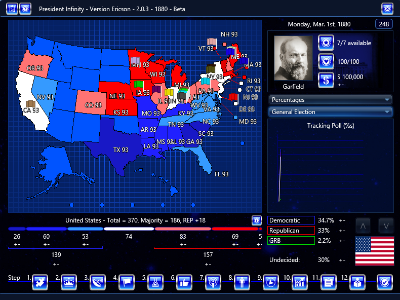*This election was updated by the Historical Scenario Commission on Aug 15, 2017. It can be downloaded here: United States – 1880 v 2.0
This election takes place at an early stage of the Gilded Age. Corruption, currency and the tariff were major issues. Also impacting this election is President Rutherford B. Hayes fulfilling his promise to serve only one term. His election in 1876 resulted in a compromise, as the election was close enough that many Democrats felt it was stolen from their candidate, Samuel J. Tilden. As such, integrity became a key issue as well. This election also marks a point in which many former Confederate officers and politicians were elected as US politicians.
The Republicans, with Hayes declining to run for reelection, were split between the Stalwarts (Conservatives) and the Half-Breeds (Moderates). former president Grant is urged to run for a non-consecutive 3rd term by the Stalwarts, and he start off as the front-runner. His primary challenger is James G. Blaine, who leads the Half-Breeds. Both of these leaders have had a history of corruption. Therefore, the alternative choice is former Senator John Sherman, the brother of General William T. Sherman. Other candidates also make an attempt for nomination. However, there is a rising Dark Horse candidate named James A. Garfield who seems likable by all sides.
The Democrats want their 1876 choice, Bourbon Democrat (Conservative wing) Samuel J. Tilden, to run for the nomination again. He declines, leaving an open field. The front-runner is Civil War general Winfield Scott Hancock, who appears to be something of a moderate Bourbon Democrat. His main competition is Bourbon Democrat Thomas Bayard. A field of many other Democrats along the political spectrum run for the nomination as well.
The Greenback party is the 3rd party for this election.
This election allows for many what-if scenarios:
- What if Rutherford B. Hayes runs for reelection? Can he launch a strong campaign when he has broken a promise to stay out of the race?
- What if a relatively politically inexperienced Benjamin Harrison ran for election?
- What if Robert Todd Lincoln had been pushed to run in 1880 to cater to Abraham Lincoln nostalgia?
- What if Civil Rights activists had pushed Frederick Douglass to run?
- What if Samuel J. Tilden had agreed to run for the nomination again?
- What if General George B. McClellan attempted another run now that he has political experience?
- What if former nominee Horatio Seymour chose to run again now that the political climate allows for a Democratic victory?
- What if former Confederates pushed for a Southern alternative for a Democratic nominee by supporting Civil War Generals John B. Gordon and Joseph E. Johnston or former Confederate Vice-President Alexander Stephens, all of whom are now sitting US politicians?
Feedback is desired.

